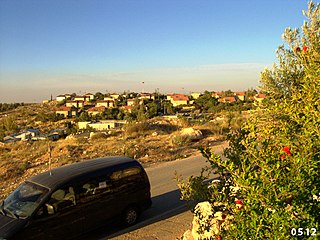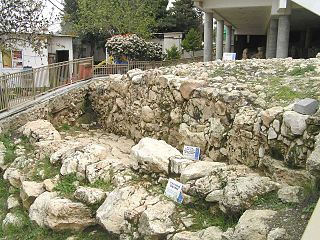The International Solidarity Movement (ISM) is a Palestinian-led movement focused on assisting the Palestinian cause in the Israeli–Palestinian conflict. ISM is dedicated to the use of nonviolent protests and methods only. The organization calls on civilians from around the world to participate in acts of nonviolent protests against the Israeli military in the West Bank and the Gaza Strip.

Ma'on is an Israeli settlement organized as a moshav shitufi in the West Bank. Located in the Judean Hills south of Hebron and north of Beersheba, it falls under the jurisdiction of Har Hevron Regional Council. In 2019 it had a population of 595.
Norman Frank Kember is an emeritus professor of biophysics at Barts and The London School of Medicine and Dentistry and a Christian pacifist active in campaigning on issues of war and peace. As a Baptist, he is a long-standing member of the Baptist Peace Fellowship of North America and the Fellowship of Reconciliation. As a conscientious objector to military service, he worked in a hospital in the early 1950s, which stimulated his interest in medical physics. He has been involved with the "Peace Zone" at the annual Greenbelt Festival.
The Christian Peacemaker hostage crisis involved four human rights workers of Christian Peacemaker Teams (CPT) who were held hostage in Iraq from November 26, 2005 by the Swords of Righteousness Brigade. One hostage, Tom Fox, was killed, and the remaining three freed in a military operation on March 23, 2006.

Thomas William Fox was an American Quaker peace activist, affiliated with Christian Peacemaker Teams (CPT) in Iraq. He was kidnapped on November 26, 2005, in Baghdad along with three other CPT activists, leading to the 2005-2006 Christian Peacemaker hostage crisis. His body was found on March 9, 2006.
Nafez Assaily, born in 1956 in the West Bank, in the Old City of Jerusalem grew up in Hebron, and is a sociologist and Palestinian peace activist. As early as 1997 he was defined as a Palestinian who had argued for a comprehensive strategy of non-violence through 43 years of the failure to achieve anything by armed struggle.

Tel Rumeida/Jabla al-Rahama is an agricultural and residential area in the West Bank city of Hebron. Within it lies an archaeological tell whose remains go back to the Chalcolithic period. It may have been a Canaanite royal city. Some Jewish scholars believe it was the location of biblical Hebron. It is also the location of a Palestinian neighbourhood and an Israeli settlement.
The Israeli–Palestinian conflict in Hebron refers to an ongoing conflict between Palestinians and Jewish settlers in the West Bank city of Hebron in the context of the Israeli–Palestinian conflict. Hebron has a Palestinian majority, consisting of an estimated 208,750 citizens (2015) and a small Jewish minority, variously numbered between 500 and 800. The H1 sector of Hebron, home to around 170,000 Palestinians, is governed by the Palestinian Authority. H2, which was inhabited by around 30,000 Palestinians is under Israeli military control with an entire brigade in place to protect some 800 Jewish residents living in the old Jewish quarter. As of 2015, Israel has declared that a number of special areas of Old City of Hebron constitute a closed military zone. Palestinians shops have been forced to close; despite protests Palestinian women are reportedly frisked by men, and residents, who are subjected every day to repeated body searches, must register to obtain special permits to navigate through the 18 military checkpoints Israel has set up in the city center.
The German Mennonite Peace Committee, German: Deutsches Mennonitisches Friedenskomitee (DMFK), is the peace office of the Arbeitsgemeinschaft Mennonitischer Gemeinden in Deutschland (AMG). The peace office is financially supported by Mennonite congregations and interested lay persons. Its work is organized by the director, the DMFK board and various peace activists. The DMFK characterizes its vision for the world in the words "divine peace and justice taking on bodily form". The DMFK works with Mennonite and other congregations, seeking to nurture peace practices as well as theological reflections on it. The current director is James (Jakob) Fehr. The offices are located in Bammental, near Heidelberg.
Jerry Levin born Jeremy Isadore Levin. He was a former CNN network journalist. He wrote on nonviolence, with an emphasis on the Middle East and in particular Palestine and Israel.

Tawani or at-Tuwani is a small Palestinian village in the south Hebron Hills of the Hebron Governorate. Many of the village's residents live in caves. The village is located south-east of the village of Yatta. Approximately one kilometre away lies Tel Tuwani, near the Israeli settlement of Ma’on. Frequent disputes occur between at-Tawani's residents and settlers over land, roads and water resources.

Mervin Eugene "Gene" Stoltzfus was an American peace activist, international development worker, founding director of Christian Peacemaker Teams (CPT), and pioneer in the international peace team movement. Drawing upon his Mennonite roots in pacifism and conscientious objection, Stoltzfus played a critical role in the anti-war movement among American aid workers in Vietnam in the 1960s, and helped shape diverse efforts of the global peace and justice community over the next forty years. As long-time director of CPT, he developed a practical vision of international justice-making through the use of grassroots faith-based peace teams, trained in the discipline of nonviolent direct action.
Meta Peace Team (MPT), formerly Michigan Peace Team, is a nonprofit, grassroots organization founded in 1993 that seeks to pursue peace through active nonviolence and create an alternative to militarism through empowered peacemaking. MPT provides creative nonviolence training workshops to ordinary citizens with a framework of third party nonviolent intervention (TPNI), and it deploys peace teams to conflict areas both domestically and internationally. Its peace teams have worked in places such as Iraq, Haiti, Bosnia, Egypt, Panama, Mexico, Gaza Strip, and the West Bank; they have also been placed within the United States to create peaceful presences at national and state political conventions, Ku Klux Klan rallies, and gay pride parades, among many other events. MPT also works in collaboration with other peace and justice groups around the globe, including Nonviolent Peaceforce, Christian Peacemaker Teams, Veterans for Peace, the International Solidarity Movement, Peace Brigades International, the Shanti Sena Network, and the Metta Center for Nonviolence. Its current offices are located in Lansing and Detroit, Michigan. MPT is a founding member of the Shanti Sena Network.
The Baqa'a Valley, sometimes called Beqa'a Valley, is a fertile agricultural Palestinian area in the West Bank, just east of Hebron. Located in the area are the Palestinian villages Al Bowereh, Al Baqa and Wadi al-Ghrous. The Israeli settlement Givat Harsina abuts on the northern outskirts; Kiryat Arba borders the south. The Valley is occupied by Israel since 1967. Apart from the Israeli settlers, the area is mainly populated by members of the Jaber clan.
Al Bowereh or Al-Bweireh, also known as Aqabat Injeleh, is a Palestinian village located just east of Hebron. It is situated adjacent to and north of the Israeli settlement Givat Harsina. The village is occupied by Israel since 1967, together with the rest of the West Bank.
Harmeet Singh Sooden is a Canadian-New Zealand anti-war activist who volunteered for the international NGO Christian Peacemaker Teams in Iraq. He was held captive in Baghdad with three others for almost four months until being freed by multi-national forces on 23 March 2006.

Wadi al Hussein, sometimes referred to as 'Wadi Nasara, is a wadi east of and adjacent to the city of Hebron. The valley connects the Kiryat Arba settlement with the Israeli-controlled H2 area of Hebron's old city. The borders of the valley are Othman Bin Afan Street, also known as Zion Street or Worshipers' Way in the west; Wadi Al Nassara in the north; the Kiryat Arba fence in the east; Wadi Al Ghrous and the road connecting Kiryat Arba with Zion Street in the south.
Jewish Israeli stone-throwing refers to criminal rock-throwing activity by Jewish Israelis in Mandatory Palestine, Israel, the West Bank, the Gaza Strip and Jerusalem. It includes material about internecine stone-throwing, in which Haredi Jews throw stones at other Jews as a protest against what they view as violations of religious laws concerning Shabbat, modest clothing for women and similar issues, and material about stone-throwing by extremists in the settler movement.

Israeli settler violence refers to acts of violence committed by Jewish Israeli settlers and their supporters against Palestinians and Israeli security forces, predominantly in the West Bank. In November 2021, Defense Minister Benny Gantz discussed the steep rise in the number of incidents between settlers and Palestinians in the West Bank, many of which result from attacks by residents of illegal settler outposts on Palestinians from neighboring villages.

Issa Amro is a Palestinian activist based in Hebron, West Bank. He is the co-founder and former coordinator (2007-2018) of the grassroots group Youth Against Settlements. Amro advocates the use nonviolent resistance and civil disobedience to fight the Israeli Occupation of the Palestinian Territories. In 2010, he was declared "human rights defender of the year in Palestine" by the Office of the United Nations High Commissioner for Human Rights In 2013, the United Nations Human Rights Council expressed concern for his wellbeing and safety due to numerous accounts of harassment from Israeli soldiers and settlers and a series of arbitrary arrests. At present, Amro is being indicted by the Israeli military court with 18 charges against him. In May 2017, Bernie Sanders along with three U.S. Senators and 32 Congressmen wrote to Secretary of State Rex Tillerson to urge Israeli authorities to reconsider the charges against Amro.









